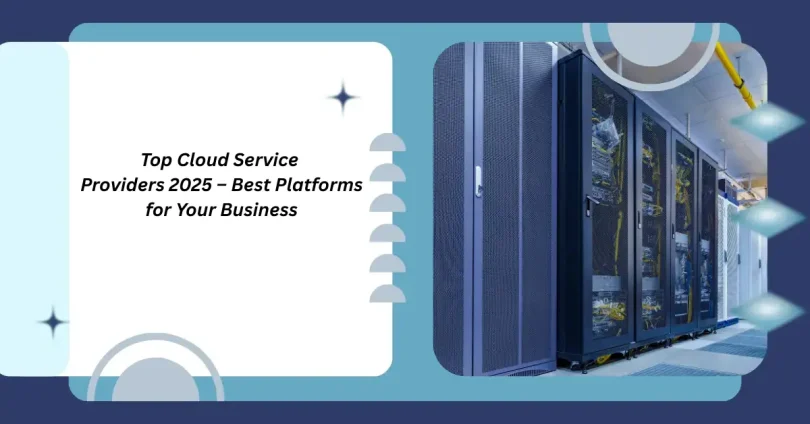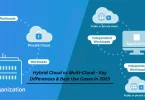Introduction
In today’s fast-moving digital world, businesses rely heavily on cloud platforms to store data, run applications, and scale operations. With so many providers offering different features, it can be tricky to choose the right one. That’s why we’ve created this helpful guide on the Top Cloud Service Providers 2025 – Best Platforms for Your Business. Whether you’re a small startup or a large enterprise, this article will help you find the best cloud platform to match your needs, budget, and goals. Let’s explore which providers are leading the way in 2025!
What is “Top Cloud Service Providers 2025”?

Top Cloud Service Providers 2025 refers to the leading companies that offer cloud computing services in the year 2025. These providers deliver essential tools and technologies like data storage, servers, networking, databases, and software over the internet. Instead of managing physical hardware, businesses can use these cloud platforms to run apps, store files, and grow faster.
In 2025, the top providers are known for their high performance, strong security, global availability, and support for the latest technologies like AI and machine learning. They help businesses of all sizes stay flexible, cost-effective, and competitive in today’s digital world.
You may also like it:
Cloud Compliance Requirements – Ensure Secure & Lawful Cloud Operations
Securing Multi-Cloud Environments – Strategies for Safer & Smarter Cloud Protection
Top Cloud Security Tools 2025 – Protect Your Data with Trusted & Powerful Solutions
Why Top Cloud Service Providers 2025 Are Important
Choosing the right cloud provider in 2025 is critical for business success. Here’s why these top providers matter for your operations and growth:
Business Scalability and Flexibility
- Easy to Scale Resources:
Cloud providers let you quickly increase or decrease resources based on your needs without buying extra hardware. - Support for Global Growth:
With data centers worldwide, your business can expand easily into new markets with better performance. - Flexible Service Options:
You can choose from various services (compute, storage, AI, etc.) and only pay for what you use.
Improved Security and Compliance
- Built-In Security Features:
Top providers offer strong security tools like firewalls, encryption, and access control by default. - Regular Compliance Updates:
They follow global security standards (e.g., GDPR, HIPAA), helping your business stay legally compliant. - Data Backup and Disaster Recovery:
Most providers include automatic backups and fast recovery options to protect your data from loss.
Cost Efficiency and Savings
- Pay-as-You-Go Pricing:
You only pay for what you use, reducing waste and saving money on unused resources. - Reduced Hardware Costs:
No need to invest in expensive physical servers or maintenance — everything runs in the cloud. - Access to Advanced Tech at Lower Cost:
Cloud services give access to AI, big data, and automation tools without high upfront investments.
Support for Innovation and Growth
- AI and Machine Learning Tools:
Top platforms include easy-to-use AI services that help automate tasks and gain insights. - Developer-Friendly Environments:
They offer tools and APIs to build, test, and launch applications faster than ever before. - Faster Time to Market:
You can develop and deploy new products quickly, staying ahead of competitors.
Reliable Performance and Uptime
- Global Data Center Networks:
With multiple regions and zones, your apps and services stay fast and responsive worldwide. - High Uptime Guarantees:
Top providers promise 99.9%+ uptime, meaning fewer disruptions and more reliable service. - Load Balancing and Traffic Management:
They help distribute user traffic efficiently, keeping your services stable even during peak times.
Step-by-Step Guide: Top Cloud Service Providers 2025

Choosing the right cloud provider doesn’t have to be complicated. Follow these steps to make a smart and confident decision for your business.
Step 1: Understand Your Business Needs
- Define Your Goals:
Are you looking for data storage, app hosting, AI tools, or something else? Know your purpose. - Estimate Usage & Budget:
Understand how much traffic, storage, or computing power you need—and how much you can spend. - Check Industry Requirements:
Some industries (like healthcare or finance) need specific security or compliance features.
Step 2: Compare Top Providers
- List Leading Options:
Focus on trusted names like AWS, Azure, Google Cloud, IBM Cloud, Oracle, and others in 2025. - Review Features:
Look at each provider’s offerings like AI tools, server speed, backup options, and global coverage. - Evaluate Support & Security:
Check what kind of technical support, security standards, and uptime guarantees are included.
Step 3: Test with Free Tiers or Trials
- Start with a Free Plan:
Most top providers offer free trials or limited services at no cost—perfect for testing. - Deploy a Small Project:
Use a real use-case (e.g., simple app, file storage, or database) to see how the platform works. - Explore the Dashboard & Tools:
Test ease of use, automation tools, and integration with other software.
Step 4: Consider Long-Term Scalability
- Look for Auto-Scaling:
Ensure your chosen provider can handle growth in users, data, and apps without issues. - Check Multi-Region Availability:
Make sure your provider has data centers in the regions you plan to serve. - Plan for Future Features:
Choose a platform that keeps evolving with new technologies like AI, serverless, and edge computing.
Step 5: Read Reviews and Case Studies
- Look for Real-World Use Cases:
Read how other businesses (especially in your industry) have used these platforms successfully. - Check Ratings & Feedback:
Review user opinions on pricing, support, performance, and reliability. - Learn from Challenges:
Understand the pros and cons other users faced before making your final choice.
Step 6: Make Your Selection and Launch
- Pick the Best Fit:
Choose the provider that aligns with your goals, budget, and technical needs. - Set Up Your Account:
Create an account, set up billing preferences, and configure user roles. - Start Your Cloud Journey:
Launch your project, monitor usage, and take advantage of support and learning resources.
Advantages and Disadvantages of Top Cloud Service Providers 2025
| Advantages | Disadvantages |
| Scalable Infrastructure Top providers offer on-demand scalability, allowing businesses to easily increase or decrease resources based on needs. | Complex Pricing Structures While flexible, cloud pricing can be confusing, especially with hidden fees for bandwidth, storage, or support. |
| Advanced Technologies They provide access to cutting-edge tools like AI, machine learning, automation, and analytics without the need for large investments. | Vendor Lock-In Risks Switching providers later can be difficult and costly due to platform-specific tools and configurations. |
| Strong Security Standards Leading providers follow global security protocols, offer encryption, firewalls, and compliance certifications for data protection. | Internet Dependency Cloud services require a stable internet connection; any outages can affect access and operations. |
| Global Reach and Performance With multiple data centers worldwide, businesses can serve global customers with low latency and high uptime. | Learning Curve for New Users Using advanced cloud platforms can be challenging for beginners without technical knowledge or support. |
| Flexible Pricing Models Pay-as-you-go and subscription options help businesses control costs and only pay for the resources they use. | Data Privacy Concerns Although secure, storing sensitive data in the cloud can raise concerns about control, privacy, and third-party access. |
You may also like it:
Cloud Security Best Practices 2025 – Protect Your Data with Smarter & Safer Strategies
Real-Time Data Processing with AI – Faster Insights & Smarter Decisions
Top Benefits of AI Cloud Integration – Smarter Faster & Scalable Business Solutions
FAQs – Top Cloud Service Providers 2025
What are cloud service providers?
Cloud service providers are companies that offer online tools like storage, servers, and apps so you can run your business without needing physical hardware.
Why should I use a top cloud provider in 2025?
Top providers offer faster performance, better security, and access to the latest tech like AI—all while helping you save money and scale easily.
Which cloud provider is best for small businesses?
DigitalOcean and Google Cloud are great choices for small businesses due to simple tools, clear pricing, and developer-friendly features.
Is it expensive to use cloud services?
It depends on what you use. Most providers offer free plans or pay-as-you-go pricing, so you only pay for what you need.
Can I switch providers later if I want to?
Yes, but it can be tricky. Some tools and settings don’t move easily between providers, so it’s best to choose carefully from the start.
Are cloud services safe for my data?
Yes, top providers use strong security tools like encryption, firewalls, and regular backups to protect your data.
Do I need technical skills to use cloud platforms?
Basic cloud use is easy, but advanced features may need some tech knowledge. Many providers offer tutorials and support to help.
Conclusion
Choosing the right cloud service provider in 2025 can make a big difference in your business growth, security, and cost savings. With so many powerful options like AWS, Azure, Google Cloud, and others, there’s a perfect fit for every need. Take time to compare features, test free plans, and pick the one that matches your goals. The right platform will help your business run smarter, faster, and more securely.
Bonus Points
- Use Cloud Cost Calculators
Most providers offer free cost calculators to help estimate your monthly or yearly cloud expenses. This can prevent billing surprises. - Explore Training and Certifications
Top cloud platforms offer free and paid training programs. Learning these can boost your skills and help your team use the cloud more effectively. - Consider Multi-Cloud Strategy
Using more than one cloud provider can improve reliability, reduce risks, and give you the best features from multiple platforms. - Check for Local Data Centers
Choosing a provider with data centers in your region can improve speed and help with data privacy or legal requirements. - Take Advantage of Support Options
Look into the available support plans—some providers offer 24/7 chat or dedicated help for faster issue resolution.
You may also like it:
AI-Driven Cloud Analytics – Smarter Data Insights for Modern Businesses
Intelligent Cloud Platforms – Smart Scalable & Secure Computing Solutions
Top Cloud-Based Machine Learning Tools in 2025 – Features Benefits & Use Cases
AI in Cloud Computing 2025 – Latest Trends Innovations & Future Insights






